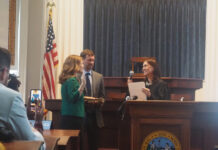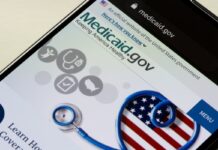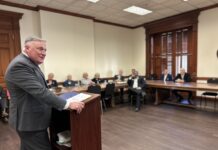
(States Newsroom) — Monday’s U.S. Supreme Court decision granting the presumption of criminal immunity for official actions taken by a president fundamentally altered U.S. democracy, President Joe Biden said from the White House Monday evening.
Speaking for less than five minutes, Biden said the 6-3 decision contradicted the spirit of the country’s founding — set to be celebrated nationwide this week on the Fourth of July — that no one is above the law.
“This nation was founded on the principle that there are no kings in America,” Biden said. “Each of us is equal before the law. No one — no one — is above the law, not even the president of the United States.”
The immunity decision, written by Chief Justice John Roberts for the court’s conservative majority, undermined that principle, Biden said.
Biden added that the decision would almost certainly mean a jury would not decide the criminal case accusing former President Donald Trump of conspiring to illegally overturn his 2020 loss before November’s election, which Biden called a “disservice to the American people.”
Roberts opinion
The ruling tasked a federal trial court with determining which actions then-President Trump took seeking to overturn the 2020 presidential election were conducted as “official” acts of the president. Those actions are entitled to “the presumption of immunity,” Roberts wrote.
The ruling protected the power of an office that itself makes up an entire branch of government, Roberts said, and was consistent with the constitutional framers’ view that the president has broad powers and responsibilities.
“Accounting for that reality — and ensuring that the President may exercise those powers forcefully, as the Framers anticipated he would — does not place him above the law,” Roberts wrote. “It preserves the basic structure of the Constitution.”
But Biden called the decision “a dangerous precedent” that would give presidents nearly unrestrained power.
“The power of the president will no longer be constrained by the law, even by the Supreme Court of the United States,” he said. “The only limits will be self-imposed by the president alone.”
Biden invoked the example of George Washington, who he said restrained the power of the presidency, and pledged he would continue to “respect the limits of the presidential powers.”
But, he said, the ruling empowered future presidents, possibly including Trump, to ignore the law.
Jan. 6 attack
Biden said Trump was responsible for the Jan. 6, 2021, attack on the U.S. Capitol that disrupted the certification of Biden’s defeat of Trump in the 2020 election. Trump’s efforts to undermine the election results, culminating in the Jan. 6 attack, are the subject of the federal indictment the former president challenged by asserting presidential immunity.
“Four years ago, my predecessor sent a violent mob to the U.S. Capitol to stop the peaceful transfer of power,” Biden said. “We all saw with our own eyes. We saw what happened that day … I think it’s fair to say it’s one of the darkest days in U.S. history. Now, the man who sent that mob to the U.S. Capitol is facing potential criminal conviction.”
Biden, whose reelection campaign was still reeling Monday from a debate performance against Trump last week described even by Democrats as poor, called on voters to “do what the court should have been willing to do but would not,” and reject Trump, the presumptive Republican nominee for president, at the ballot box.
The president endorsed Justice Sonia Sotomayor’s forceful dissent in the case, quoting her phrase that the majority opinion fueled “fear for our democracy” and urging voters, too, to dissent.







